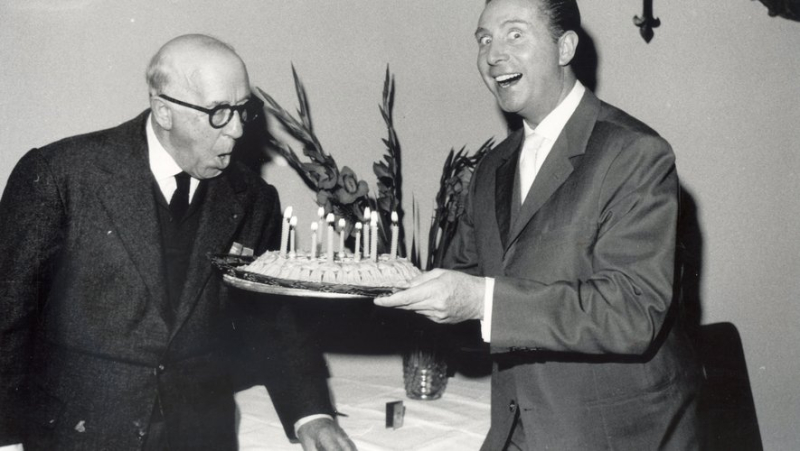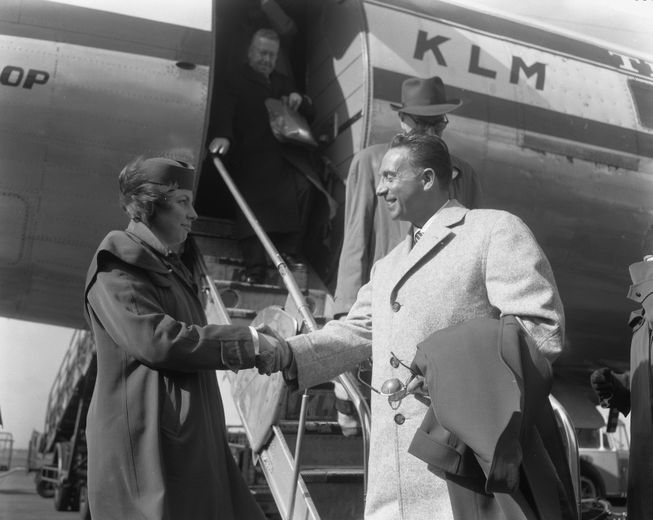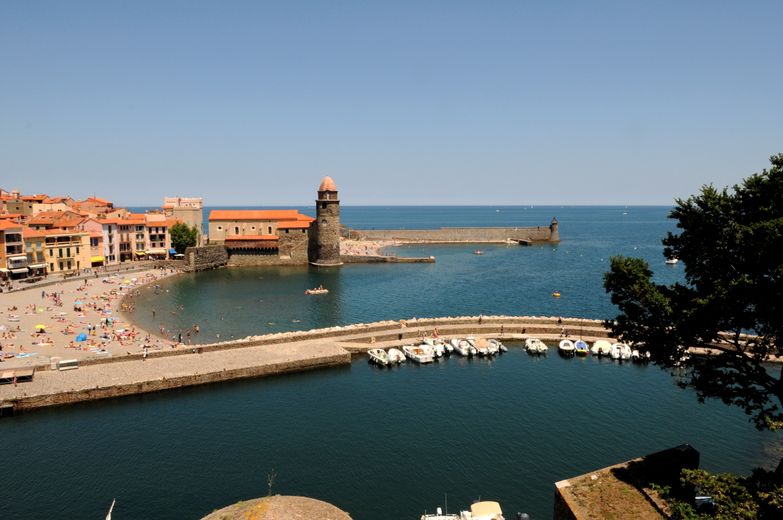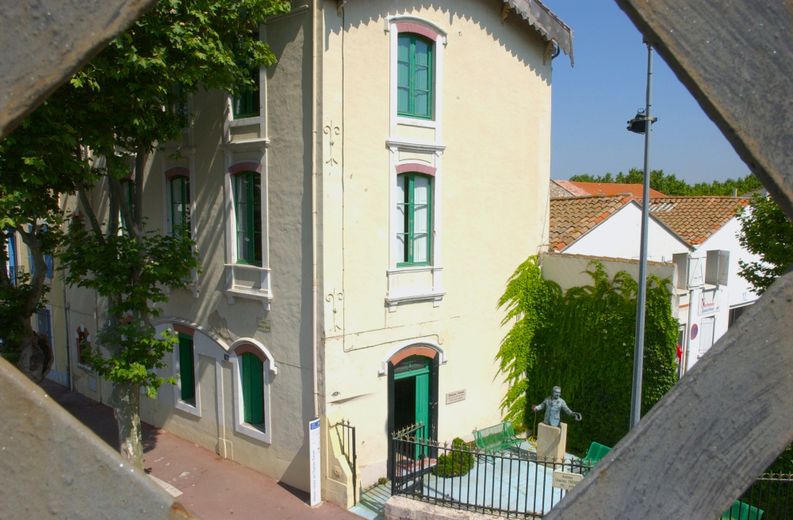HISTORY WEEKEND. At Charles Trenet, from Narbonne to Paris via Perpignan, there was not only joy…

Lucien Trenet fête ses 75 ans en 1957, aux côtés de son fils. L'Indépendant – PONTHUS
Le Fou chantant a grandi à Narbonne, étudié à Béziers, vécu à Perpignan, sur fond de maux d’enfance. Et plus tard, il a dû assumer son rôle sous l’Occupation et une homosexualité stigmatisante.

If he were still alive, Charles Trenet would have been 111 years old on May 18. He said "I make songs like an apple tree makes apples". A thousand on the heavy tree of his discography. What remains of our loves ?, There is joy, I sing, Sweet France, The sun and the moon, You who pass without seeing me , Nationale 7, Boom, The extraordinary garden… All in a dizzying lightness, against a backdrop of jazz, swing and surrealism.

Trenet sang of his attachment to Languedoc and Roussillon. Mom, don't sell the house, first, before a string of songs in the 50s: The pretty sardana, The city of Carcassonne, Font-Romeu, My young years, Narbonne my friend, What do you want me to tell you mom ?. And of course The sea…

In 1974 in Perpignan, he got out of his car to greet the crowd. The Independent
It was in Narbonne that Charles was born. The family is already in Saint-Chinian, in Hérault, a little further east. His father Lucien is a notary there. But there was no question for Marie-Louise, her mother, of giving birth anywhere other than in her hometown, the glorious capital of a Roman province. In his eyes, Saint-Chinian is not a “remote town, surrounded by the vineyards of Minervois”, without gas or electricity, says Jean-Philippe Ségot in his biography, Charles Open-air Trenet (at Fayard). They return to Saint-Chinian but for a short time.
The pleasures of the coast
Born on the eve of the First War, in 1913, he owed his return to Narbonne to the world conflict. Lucien, his father, is mobilized. "Mom took us to the seaside, said Trenet. On the ponds of Bages, Sigean, Gruissan or La Nouvelle. The Languedoc coastline was disdained by tourists. It was a true paradise of mosquitoes, beaten by the winds, populated by migratory birds, where fishermen and hunters reigned. With the increase in wine prices, merchants planted vines all around Narbonne."

Dali and Trenet, two crazy artists in their own way. The Independent – BARD

The Trenets rent a white fishing cabin in La Nouvelle. "It was therefore at La Nouvelle that Charles discovered this sea which would make him famous throughout the world!", underlines Ségot. In the company of his brother Antoine, he lives surrounded by three women: his mother, his “tantoune" Émilie and his grandmother Marie-Anne, who died of the Spanish flu in 1918. ;rsquo;is his first "real heartbreak".
Lucien was demobilized in the spring of 1919. The couple would never live together again. Marie-Louise fell in love with the German director Benno Vigny, wounded in the war in Narbonne. Charles is a boarder in Béziers with the Brothers of the Trinity, "exiled in a hostile and icy universe" insists Jean-Philippe Ségot . He is seven years old. "I am sure that from these boarding school days, a common thing for other children, but not for an extraordinary being like Charles, dates this intermittent melancholy which shows through in his work", assured his mother.
"My childhood was a bit missed"
"My childhood was a little overlooked, overshadowed by family situations, complicated things that I understood too well", assures the singer. "I was afraid of Bluebeard's women, afraid of the cupboards in the house in Narbonne, and of the war which I had the impression would be all life."
He follows his father who settles in Perpignan. "If he loved Narbonne, the city of his childhood, he will love Perpignan, because the city has character and a great Catalan temperament, summarizes Jean-Philippe Ségot. In Narbonne, the peaceful one, the too provincial one, he preferred, at the time of adolescence, this sort of antechamber of the Paris of art and letters of which he dreamed< /em>."
It was in Perpignan that he met a friend of his father, Albert Bausil, "his pygmalion ". He introduced him to literature (Trenet participated in the magazine Le coq catalan by Bausil) and undoubtedly a little more…hellip; Jean-Philippe Ségot evokes the "loves" between "this man of& rsquo;around fifty years old and this fourteen year old kid". Trenet will imitate his mentor by seeking the company of young men.
Max Jacob and Jean Cocteau
"Bausil is the joy of living, fantasy itself, the sweet and tender madness that embellishes existence. He repeats it tirelessly to young Charles, who will make it one of the mottos of his life, his eternal credo." Y’has joy!
Bausil was also "a merciless polemicist" au "hard fang". Like Trenet, who knew how to be biting. His anger and his tantrums remained memorable. It was also through Bausil that Trenet met the artists Max Jacob and Jean Cocteau.
At 15, kicked out of his high school for insulting the general supervisor, he joined his mother in Berlin, before moving to the capital at 17 to quickly become the darling of all of Paris. The singer Mireille, Cocteau's neighbor, puts his foot in the door. It’s in Paris that he sparkles, finally at ease.
Trenet could have left the quivering image of the Singing Fool intact, but life wanted it otherwise. Although he retained traces of a traumatic childhood, he had to come to terms with an inglorious past under the Occupation and a stigmatizing homosexuality (read below). The death of his mother, in 1979, was "his real tragedy", assures one of his biographers, Jacques Pessis. "He pretended to be happy."

Trenet has toured extensively abroad. Here in Holland. Anefo/Pot
The plaster that stuck to his skin all his life
Captain Haddock had his plaster. Trenet too. Stuck, over the years, without being able to get rid of it. The suspicion of collaboration during the Second War, first. He signed hymns taken up by Vichy. Trenet goes where the wind brings him success. At the end of the war, a purification commission sentenced him to eight months of inactivity, reduced to three.
He then becomes the victim of latent homophobia. In 1948, he expected to triumph in New York. He is in fact imprisoned at the Ellis Island immigration center, on suspicion of homosexuality, in the land of puritanism. American justice is based on an old conviction for indecent assault, in Vernet-les-Bains, in the P.O. At 17, he had fooled around with a boy of his age.
Released from the jails of Ellis Island 26 days later, he promises a marriage that will never see the light of day. Fifteen years later, he was sentenced in 1963 to a one-year suspended prison sentence, before benefiting from a dismissal of the appeal. He still spent a month in prison. His handyman accused him of having been responsible for bringing down young men aged 19 and 20 (the majority are 21) on his behalf in his house in Aix-en-Provence . "I will admit to you that at a certain moment, I said to myself Maybe my life is over, my artistic life or my life in general."
France is shaken by the Ballets Roses affair, sexual assault on minors. The counterpart is obvious: Trenet is accused of orchestrating “blue ballets”, suspected of pedophilia. Without even that, homosexuality, penalized since a Vichy law of 1942, can land him in prison. "Young people are fresh, they're in a good mood, they're well disposed", said Trenet.
Le Fou chantant was made obsolete by the yéyés in the 60s, sometimes blacklisted. Excluded from decorations. Before the arrival of Mitterrand to power, who awarded him the Legion of Honor, and the help of a new generation of singers claiming affiliation, like Jacques Higelin. The Carte de Séjour group takes over a mixed Douce France.
But the plaster did not leave Trenet when he died on February 19, 2001, at the age of 87. He bequeathed his fortune to his private secretary, Georges El Assidi. He entrusted its management to a company which, according to him, abused him. And he also had to face appeals from the singer's half-sister and nephew for abuse of weakness. At the end of numerous legal procedures, Georges El Assidi is now officially the sole heir.


Collioure and the Mediterranean Sea, sung by Charles Trenet. Max Berullier

Hymns to Aude and the Pyrénées-Orientales
Charles Trenet sang of Aude and the Pyrénées-Orientales throughout his eminently nostalgic memories of his youth. Small non-exhaustive anthology of songs… Mom, don't sell the house (1935), first: "I know life is hard, Dad no longer sells paint even though he sleeps until midnight. I know you don’t have money like you used to. Mom, don't sell our old house, I'll make a million soon. I will buy you dresses, hats, shiny jewelry and a small car. Let's keep the corridor, the attic ladder, and the maid who limps with one foot, the old reddened stove, the song which makes a purr. Mom, don't sell the house […]."
There was also, of course, La mer (1946) : "The sea, which we see dancing along the clear gulfs, has silver reflections. The sea, changing reflections, in the rain. The sea, in the summer sky, confuses its white sheep with the pure angels. The sea, shepherd of infinite azure. See, near the ponds, these large wet reeds, see these white birds and these rusty houses. The sea lulled them along the clear gulfs and with a song of love. The sea has rocked my heart for life."
My young years (1950) : "My young years run in the mountain, run in the paths, full of birds and flowers. And the Pyrenees sing to the wind of Spain, sing the melody that rocked my heart […]."
The city of Carcassonne (1951) : "In front of these old walls my heart shivers, instead of the armor, jazz tunes resonate. They are going to dance bebop and it is a huge success. In the dungeons, there are happy trombones who blow songs for loving hearts. And deep in the old machicolations we hear, day and night, cries, cries […]."
La Jolie sardane (1952) : "Friends, it’s party at Collioure. We decorated the old port. And in front of the sea that surrounds it, here is the eternal golden bell tower. On the pebbles, green and pink, the tenderly colored boats begin the metamorphosis. From their sails changed into flowers and under the wandering moon the sardana forms its circle. How pretty the sardana is that we dance hand in hand […]".
He also sang Font-Romeu (1953) and his “hermitage where I&rsquo ;would love to come back to admire the landscape".
Obviously National Route 7 : "Of all the roads in France and Europe, the one I prefer is the one that leads by car or hitchhiking to the shores of the South. Nationale 7, you have to take it whether you go to Rome in Sète, whether you are two three four five six or seven, it's a road that is profitable".
And Narbonne my friend (1961) : "Goodbye land of dreams from the time of my childhood, where Monge’s cab took me on vacation. Goodbye to the whole city, the visit is over. Goodbye to the cemetery where Aunt Émilie sleeps."

The birthplace of Charles Trenet, transformed into a museum. Françoise Tallieu
The house turned into a museum
The artist's birthplace is the one where "there’s souvenirs at the bottom of each drawer, perfumes in the closets", he sings in Mom, don't sell the house.
It was rehabilitated and transformed into a museum, thanks to the insistence of three recognized admirers: the designer Cabu, the Narbonne documentarian Marc Azéma and one of Trenet's biographers, Jacques Pessis .
The interactive scenography mixes archival documents and personal memories. The museum, managed by the City of Narbonne, is located at number 13 of what became Avenue Charles-Trenet.
Entry 4 €. Tel: 04 68 58 19 13.
I subscribe to read more




